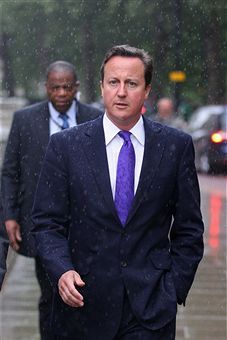 There may be a lot of debate about what the “big society” means, but
there’s one thing we should all be able to agree on: we live in a big society – and it’s getting bigger. 62 million today. 64 million in five year’s time. And then on up to
70 million by 2028, according to the government. (No, I’m not doing my bit, as my wife is about to have our third child.) What’s odd is how little debate there’s been at
Westminster about all this.
There may be a lot of debate about what the “big society” means, but
there’s one thing we should all be able to agree on: we live in a big society – and it’s getting bigger. 62 million today. 64 million in five year’s time. And then on up to
70 million by 2028, according to the government. (No, I’m not doing my bit, as my wife is about to have our third child.) What’s odd is how little debate there’s been at
Westminster about all this.
Why? Partly because it means you have to talk about immigration (still seen as toxic by many in SW1); partly because it is one of those issues that is just so big that it almost saps the will to live. Schools, hospitals, welfare, housing, energy, transport, water – it goes to the nub of how we live and function. And partly because the consequences of this population explosion are only now emerging as a political issue on the doorstep.
Research by The Spectator (see graphs below) shows just how great the challenge is, here and now. We’re going to need to build an average of 420 schools a year in England for the next four years. This won’t be news to Michael Gove: it was he who wisely pointed this out when in Opposition. Nor is it news to the thousands of parents across the country whose councils are saying that local schools are full.
To date, this issue has been reported as a “primary schools crisis”. Join up the dots to the social housing crisis. The strains on the NHS – be it maternity wards or looking after the elderly. The congestion on our roads. The growing cost of pensions… The list is endless. And the one denominator is that our population is growing.
David Cameron highlighted this back in 2007, when he said that demographic change is “one of the most important of those challenges” we face, “and it’s time we had a grown-up conversation about it.” He rightly said that it “will put pressure on our national infrastructure – particularly in key areas like housing, public services and transport – and on resources like water and energy.” And that all this “will make it more difficult for a Conservative government to deliver its vision of opportunity, responsibility and security. And so it’s essential that we also develop a coherent strategy, and implement joined-up policy, to address population growth and the atomisation of our society.”
Cameron then went on to map out how he would tackle it. He should return to this theme – fast. It’s the right way to talk about immigration (focus on numbers) and it taps a feeling that millions of people share: our country is changing fast, is becoming more crowded, but we need to know that politicians are aware of this and tackling it.
Cameron, Theresa May and Damian Green have made a good start at controlling immigration. But that’s just a start. More needs to be done to educate the public about the challenge. We need some radical thinking about how we solve it; and we must ask ourselves whether a state that was largely constructed to cope with 50 million people can meet the challenges of 70 million people?









Comments